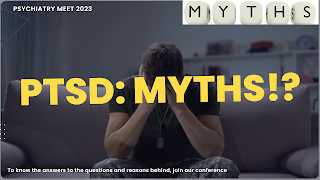PTSD: Myths!?
According to studies, PTSD does
have a variety of effects on how the brain functions. The amygdala,
hippocampus, and prefrontal cortex are the three parts of the brain most
affected by the consequences of trauma. All of these areas are important for
controlling emotions and handling fear. These areas may behave and work
differently than they did before to emotional trauma and PTSD.
Although the majority of people
will experience some kind of trauma in their lives, not everyone goes on to
acquire post-traumatic stress disorder (PTSD), and there are numerous myths and
misconceptions about it. These are a few of the typical PTSD misconceptions and
realities.
PTSD only affects military veterans
PTSD occurs immediately after a traumatic event
PTSD is a sign of weakness
Everyone who experiences trauma will develop PTSD
Everyone with PTSD experiences the same symptoms
People with PTSD are violent
PTSD will just go away over time
PTSD isn’t treatable




Comments
Post a Comment